Banish weeds for good with a
cheap weed killer
I’ll demonstrate how to create an effective spray using common household ingredients such as vinegar, salt, and liquid dish soap. In this post, I will guide you through making this simple solution, along with showcasing several other eco-friendly weed killers and providing advice on stopping weeds before they start.
Table of Contents
-
Understand Your Adversary: Getting to Know Weeds
- What Is the Most Effective Method for Eliminating Weeds?
-
How to Create an Inexpensive Weed Killer
- How This Vinegar-Based Herbicide Functions
- Potential Drawbacks
- Additional Inexpensive Methods for Eradicating and Stopping Weeds
- Frequently Asked Questions
Jillee’s Take:
Understand Your Adversary: Getting to Know Weeds
Why Are Weeds So Fond of Grass and Lawns?
If maintaining a lawn is your responsibility, you probably view weeds as bothersome pests. However, what fascinates me is that the neatly trimmed, compact grass lawns we cherish offer weeds nearly perfect conditions to flourish!
Weeds, similar to many plants, require soil, water, and sunlight to thrive. Meticulously maintained grass offers simple access to these essentials, rendering it a perfect setting for weeds to establish themselves.
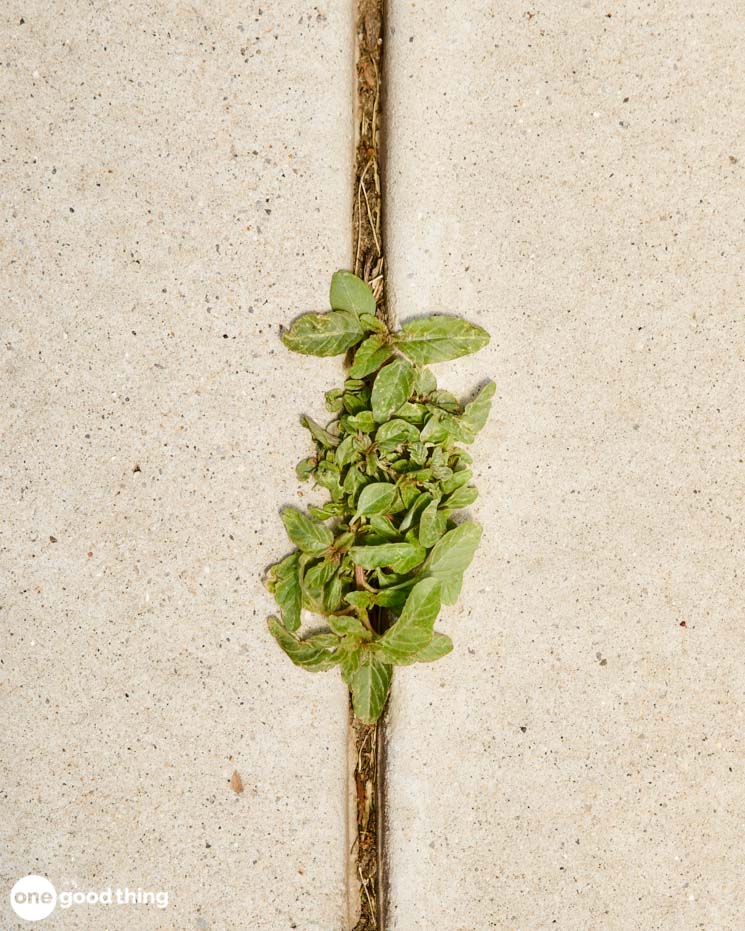
Various Kinds of Weeds
The phrase “weed” isn’t specific to a single type of plant; instead, it refers to
unwanted plants
These include some of the persistent weeds that might appear in your garden:
- Wild violet
- Wild onions
- Wild garlic
- Dandelions
- Crabgrass
- Thistles
- Bindweed
- Broadleaf weed
- Garlic mustard
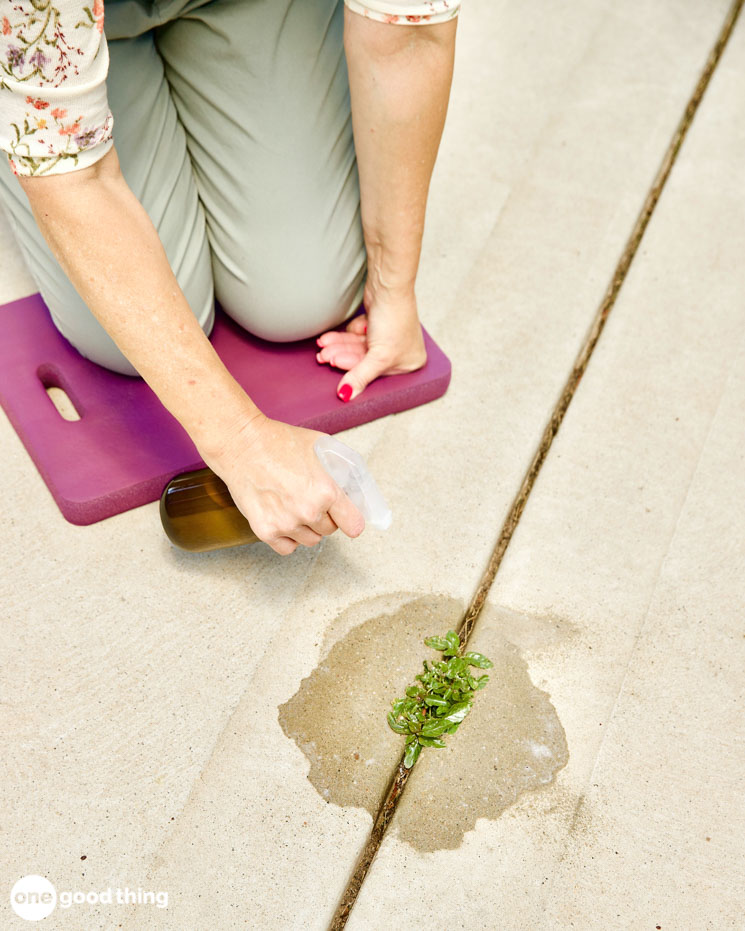
What Is the Most Effective Method for Eliminating Weeds?
Several methods can help eradicate weeds; one approach involves pulling them out manually from the soil. If you manage to extract their entire root system, this technique may prove quite successful in stopping regrowth. However, achieving complete removal isn’t always straightforward.
Another common method for eliminating weeds is through the use of herbicides, which can be readily found at home improvement and garden supply shops in various commercially available forms designed for ease of application. Nonetheless, numerous commercial herbicides (like Roundup) possess harmful properties and could potentially
present a danger to humans and pets if not used properly
, they aren’t the perfect option.
Fortunately for us, there’s a method to benefit from the ease of using store-bought herbicides as well as the security and efficiency of manual weeding: crafting your very own eco-friendly weed killer!
How to Create an Inexpensive Weed Killer
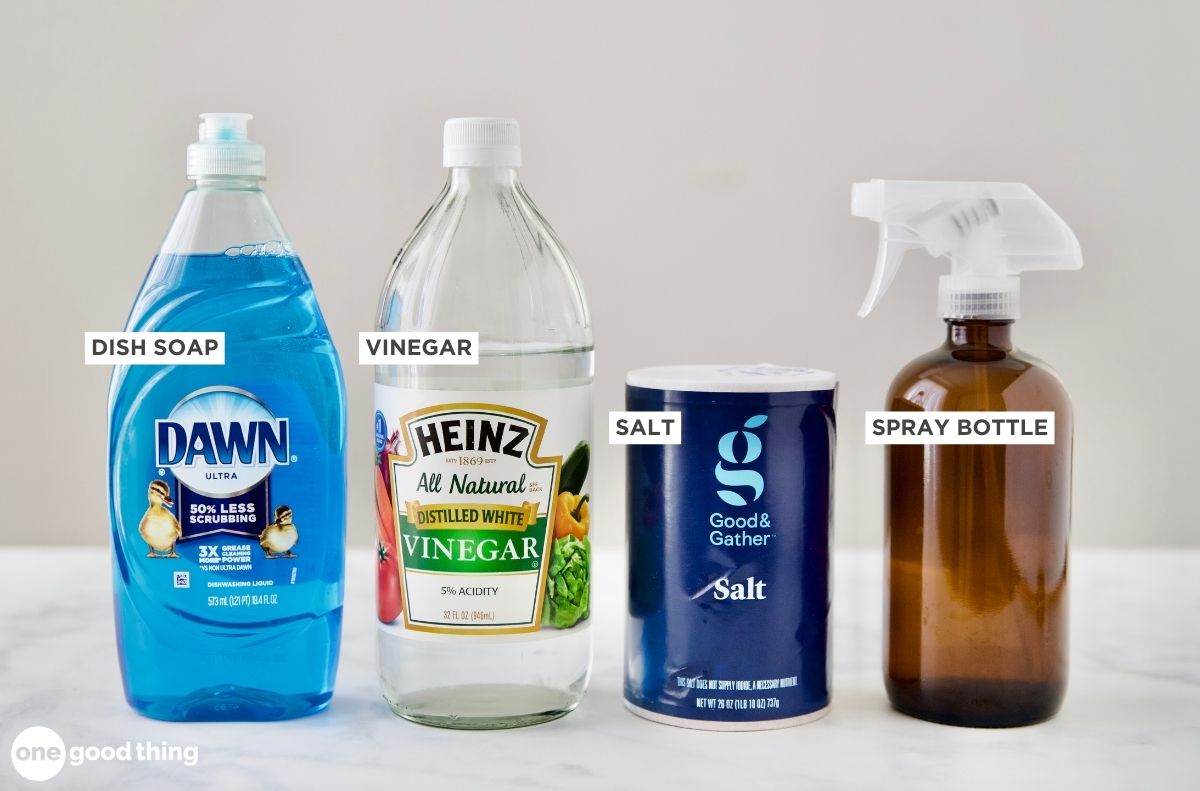
Ingredients:
- 2 cups of filtered white vinegar (or apple cider vinegar)
- 2 Tbsp table salt
- 1 tablespoon of liquid dish detergent
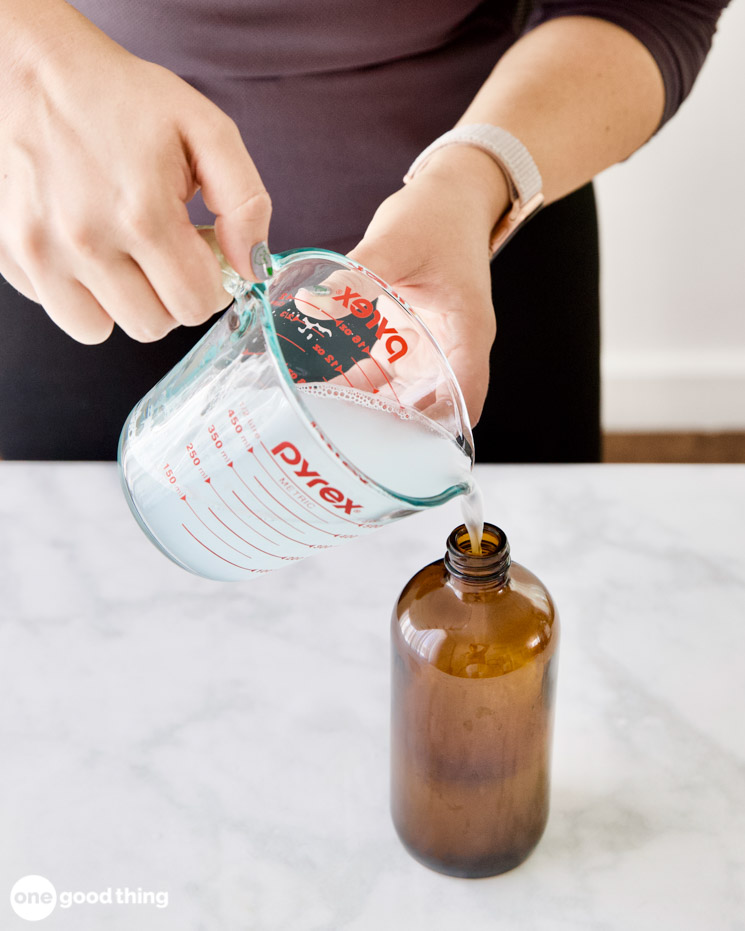
Directions:
Pour vinegar and salt into a 16-ounce spray bottle and shake vigorously until the salt dissolves (warming the vinegar slightly may assist with this process). Then add the dish soap, put back the spraying cap, and gently combine all ingredients. This enhanced formula includes an increased amount of dish soap for better performance.
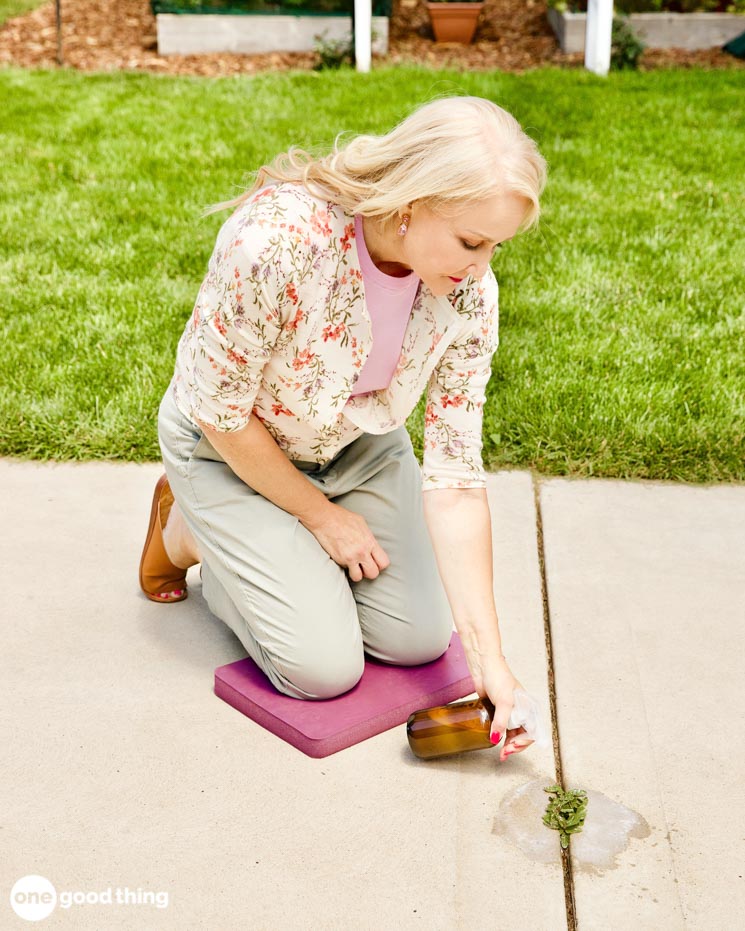
Apply this do-it-yourself herbicide to the weeds immediately upon spotting them; they respond most effectively when still young. Take care to prevent drift to spare nearby grass from damage. To achieve optimal outcomes, administer the treatment on a mild, bright day. Refrain from spraying again for a minimum of seventy-two hours after your first application.
How This Vinegar-Based Herbicide Functions
The efficacy of this spray stems from its trio of primary components: vinegar, salt, and dish soap.
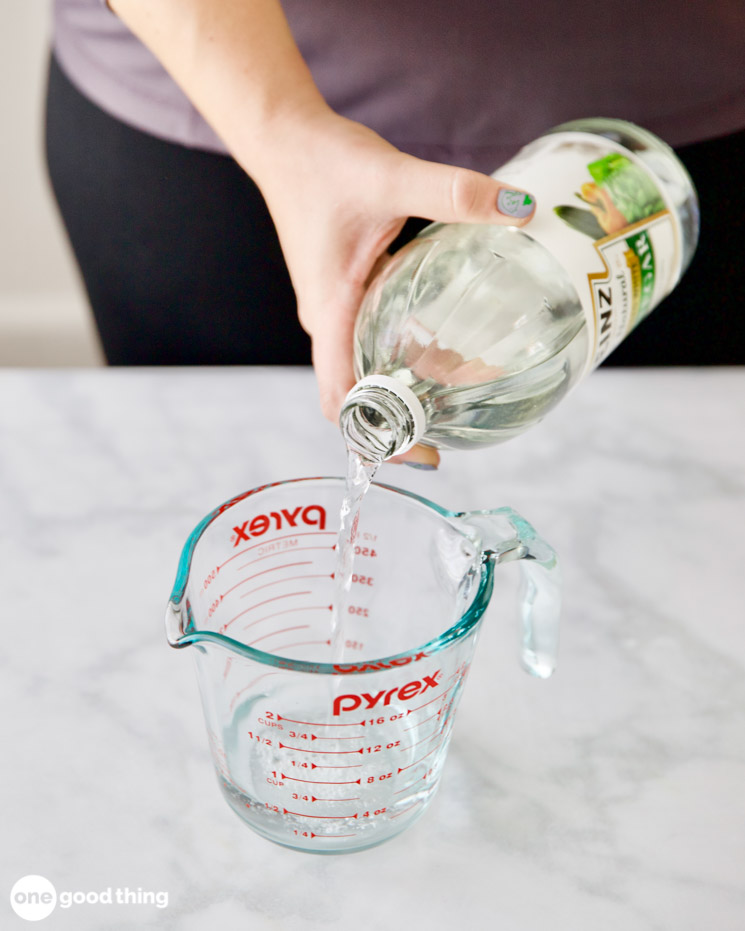
White vinegar
(or
household vinegar
contains acetic acid that
burns weeds on contact
and reduces the acidity of the nearby soil. These elements combined make it difficult for weeds to thrive, and as a result
Vinegar can last indefinitely.
There’s no need to be concerned about how long the bottle has been stored in your cupboard.
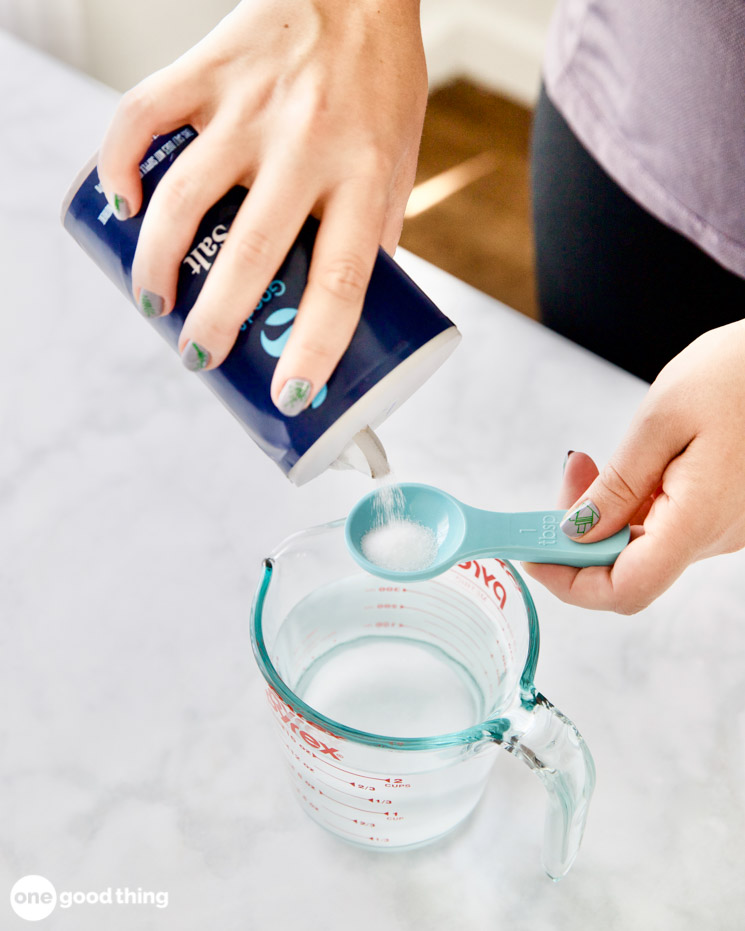
Table salt
Enhance this homemade weed killer by increasing its dehydration properties. Salt is very efficient at removing moisture from plants, especially on sunny days. When mixed with vinegar, it helps decrease the likelihood of weeds regrowing.
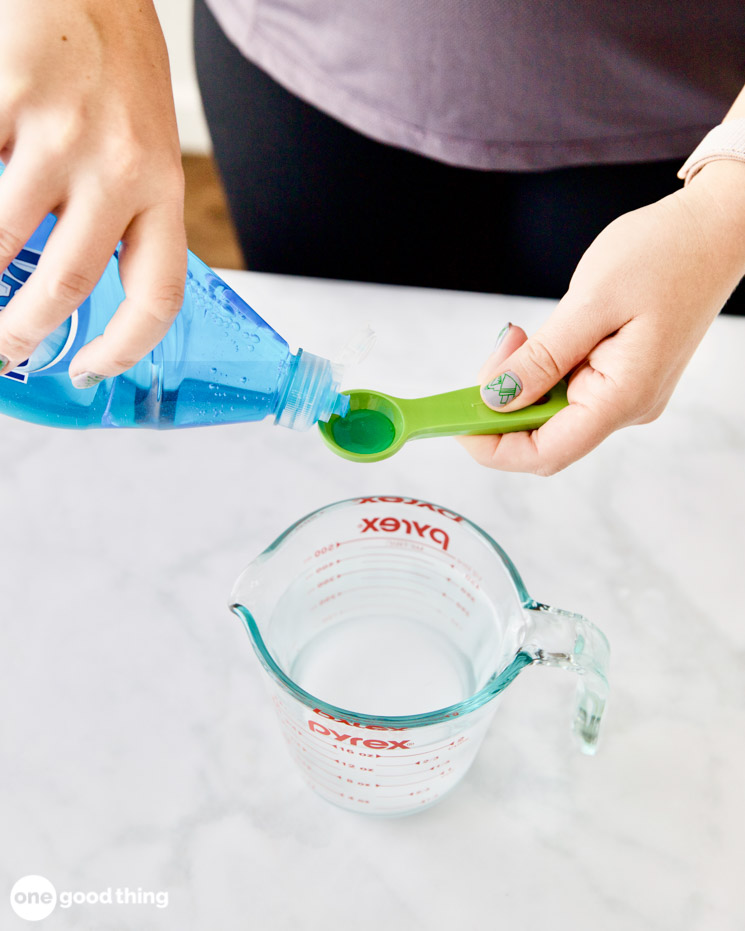
Dish soap
It acts as a surfactant that serves a crucial function in this homemade formula. This component aids the mixture in sticking effectively to the weed foliage during application instead of just running off.
Combined, these widely-used and effective components create a do-it-yourself herbicide that is:
- Cheap to make
- Easy to use
- Fast-acting
- Non-toxic
And yes,
This homemade vinegary herbicide truly does the job.
OGT reader Colleen has mentioned using this weedkiller to eliminate poison ivy—even after multiple applications.
…many individuals dislike finding dandelions in their floral arrangements, cultivated plots, and grassy areas, plus these plants aren’t exactly eye-catching! In my case, I am eagerly looking forward to using this method to eliminate several unwanted growths, including those pesky dandelions!! Thank you so much for providing this insight, Jillee!!
– OGT reader Luann
Potential Drawbacks
This DIY herbicide solution performs optimally on newly sprouted weeds since more mature ones with extensive root systems tend to be much tougher to eliminate. Additionally, weeds featuring waxy foliage might necessitate multiple treatments for effective eradication.
It’s crucial to remember that this weed killer can damage or destroy any vegetation it comes into contact with! Be very precise when applying the spray to prevent harming your lawn or garden plants.

Additional Inexpensive Methods for Eradicating and Stopping Weeds
1. Use a Propane Torch to Eliminate Weeds
You can quickly eliminate weeds using a specialized propane torch designed for this purpose. This method works well for weeds growing among stones as well as those found on driveways and sidewalks. Simply move about and activate the trigger to incinerate the unwanted plants entirely. However, they might regrow since the roots often survive, plus effectiveness varies depending on the type of weed.
You can purchase a propane torch from Home Depot for approximately $25, and a single propane tank will last you for an extended period. However, make sure you’re cautious so as not to burn your footwear!
2. Eliminate Weeds Rapidly Using Boiling Water
Should you encounter weed issues in the fissures of your sidewalk or driveway,
boiling water
Creates a fast and simple remedy! Heat up some water in your electric kettle, carry it outdoors cautiously, and pour it right onto the unwanted plants to eliminate them. This method might be the most budget-friendly approach for swiftly getting rid of grass and weeds.
This approach won’t eliminate well-established weeds completely, but it offers a swift and simple means to gain considerable weed-free time until they regenerate!
3. Employ Corn Gluten Meal To Halt Weed Development
Corn gluten meal, which comes from the process of wet corn milling, is an innocuous material capable of stopping weed seeds from sprouting in your garden. Allow the soil to become dry first, then scatter the corn gluten meal near mature plants and ensure it gets moistened with some water. Avoid irrigating the area for about two to three days following application.
Keep in mind that corn gluten meal can stop any seeds from germinating, so avoid using it until your plants are firmly established!
4. Eliminate and Suppress Weeds
To prevent weeds from thriving, they require sunlight and oxygen; thus, denying these elements can aid in eradicating them over extensive regions. Start by using a weed trimmer or lawn mower to cut back the weeds, followed by covering the area with materials like newspapers, landscape fabrics, cardboard, or natural mulches. This process cuts off their supply of light and air, causing the weeds to ultimately perish.
5. Maintain a Lush Lawn
Dense, healthy lawns make it more difficult for weeds to establish themselves compared to sparse grass areas. To deter weed development, maintain a robust lawn. In sections where your lawn has thin patches or where weeds frequently appear, take action.
a soil sample to a nearby extension service
Can assist you in uncovering the core issue (pun intended!).
Frequently Asked Questions
What Type of Vinegar Is Best to Use?
I suggest utilizing white vinegar, cleaning vinegar, or apple cider vinegar at a strength of 6-10 percent for your spray. This will enhance its efficacy without increasing the risk of causing eye or throat discomfort.
What Is the Safe Way to Apply This Herbicide?
To protect your other plants (and your face from irritation), refrain from applying weed killer when it’s breezy outside. If you must use it, ensure you apply just enough and keep animals away from the treated zone until the spray has fully dried.
Where Should I
Not
Use This Weed Killer?
Stay clear of spraying this product close to your vegetable patch or around permeable stonework to prevent unwanted harm.
What Are Some Ways to Prevent Overspray?
Utilize the “stream” setting on your spray bottle for better control over where the spray goes. You can enhance precision further by using a tall, cylindrical item such as a big can of beans from which both ends have been taken out.
Is It Possible to Utilize This Herbicide With a Sprayer?
Absolutely! For a bigger batch, use 1 gallon of vinegar, 1 cup of table salt, and 1 cup of dish soap instead. Once you’ve sprayed using your equipment, pour any remaining herbicide into an airtight container for storage and ensure you clean out the sprayer completely.
Could This Herbicide Damage My Soil?
Although excessive salt can harm your soil, the minimal amount of salt in this DIY weed killer shouldn’t raise any worries.
What Is the Proper Way to Store This Herbicide?
Transfer it into a sealed container and keep it in a cool, dry location. You can use it throughout the entire season, just as I do.
natural garden bug spray
.
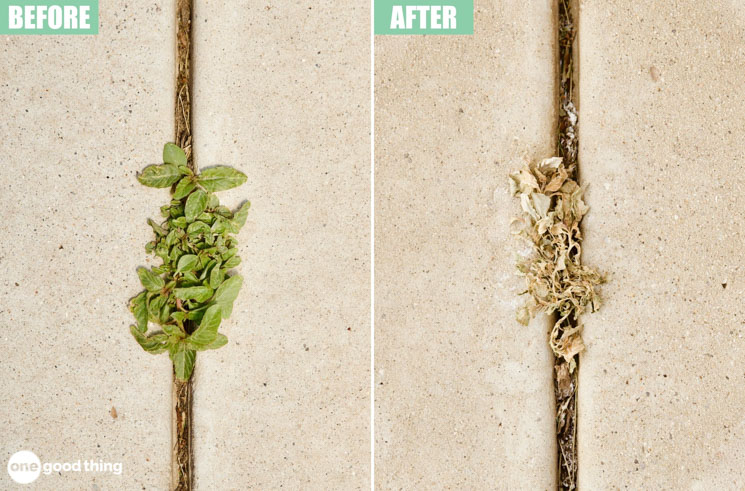
Conclusion
The battle against weeds in your lawn or garden is an ongoing struggle, yet that doesn’t imply you’re helpless. To keep those pesky plants at bay, my recommendation is to regularly inspect your property and tackle any invaders immediately. Just as noted previously, applying this budget-friendly herbicide without delay will make all the difference!
Would you share your favorite recipe for a DIY weed killer? Please let us know in the comments section below!
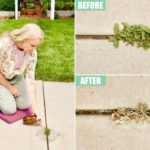
Homemade Budget-Friendly Weed Killer Recipe (Step-by-Step)
This DIY herbicide is budget-friendly, efficient, and straightforward to create using just a handful of basic components!
Servings
16
ounces
Cost
$2
Equipment
-
spray bottle
Ingredients
-
2
cups
white vinegar
-
2
Tbsp
table salt
-
1
Tbsp
dish soap
Instructions
-
Put the vinegar and salt into a 16-ounce spray bottle, put the top back on, and shake to mix them together.
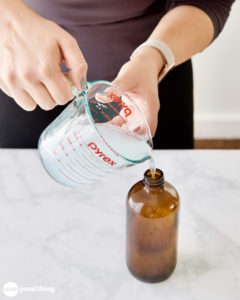
-
Take off the spray cap, pour in the dish soap, put the cap back on, and tilt the bottle slowly from side to side.
-
For application, spray directly onto the weeds once they appear, preferably on a sunny and warm day. (Be cautious to avoid overspray so as not to harm surrounding grass and plants.)



